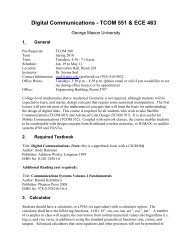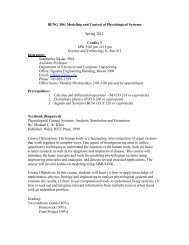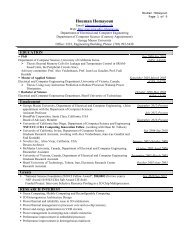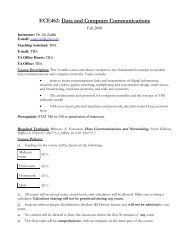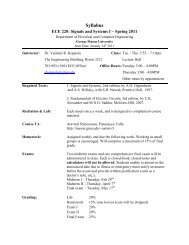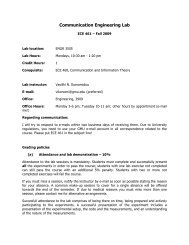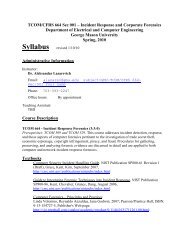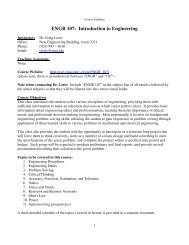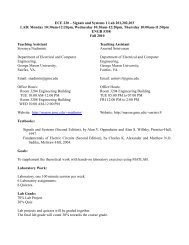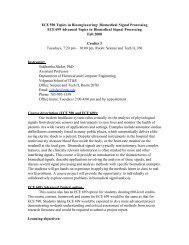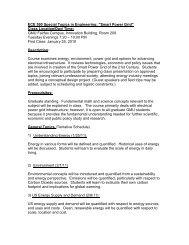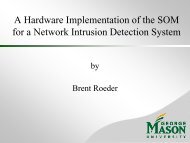ECE 430 Principles of Semiconductor Devices FALL 2011
ECE 430 Principles of Semiconductor Devices FALL 2011
ECE 430 Principles of Semiconductor Devices FALL 2011
You also want an ePaper? Increase the reach of your titles
YUMPU automatically turns print PDFs into web optimized ePapers that Google loves.
<strong>ECE</strong> <strong>430</strong> <strong>Principles</strong> <strong>of</strong> <strong>Semiconductor</strong> <strong>Devices</strong> <strong>FALL</strong> <strong>2011</strong><br />
Class Time and Location: Sec. 001 - 76314 TR 10:30 a.m. – 11:45 a.m. Room# Krug Hall 209<br />
Instructor: Alok K. Berry, Room No. 3238 in Nguyen Engineering Building TA:<br />
Phone: (703)-993-1606 email: aberry@gmu.edu<br />
Office Hours: MTWR 1:00 p.m. – 2:00 p.m. Others by appointment<br />
Textbook: <strong>Semiconductor</strong> Device Fundamentals by Robert F. Pierret, Pub. Addison Wesley, ISBN<br />
0201543931, Cost-New Book $180.00, Used Book $135.00, Rental $88.20<br />
Prereq. Math 214, <strong>ECE</strong> 305 and a grade <strong>of</strong> C or better in <strong>ECE</strong> 333; or permission <strong>of</strong> instructor<br />
Topics: Introduces solid-state physics and its application to semiconductors and semiconductor devices.<br />
Topics include band theory, doping, p-n junctions, diffusion theory, low-frequency circuits, and<br />
devices including bipolar transistor, MOSFET, CMOS, and photo transistors.<br />
Important Instructions/Information<br />
a. Prior to the class, it is expected that one reads the material which is to be covered in the class.<br />
b. Almost in every class a set <strong>of</strong> assigned homework problems will be collected, graded and then it will be<br />
returned. Home works will be accepted in class only and after grading returned in class. If you happen<br />
to miss a class when HW is returned, it is your responsibility to collect it promptly.<br />
c. Some homework solutions may be provided. Solutions to exams will be discussed in class.<br />
d. No overdue for homework and no make up for exams.<br />
In an extreme case if a makeup exam is given only 50% <strong>of</strong> the credit (what one<br />
earns in the makeup exam) may be counted in making the final grade. The makeup<br />
exam may be an oral exam.<br />
e. GMU HONOR CODE will be strictly enforced. Violations <strong>of</strong> the honor code may result in receiving no<br />
credit for this course. Any work submitted by you, which is to be graded, must be <strong>of</strong> your own. If it<br />
is found that the work submitted by a student has been copied from solution manual or from some<br />
other source then the case may be forwarded to the Honor Committee.<br />
f. Important Dates:<br />
The final drop deadline is Monday, September 30 th .<br />
The Selective Withdrawl Period is from October 3 rd to October 28 th .<br />
Grading: Home Works and Class Participation 20%<br />
Project/Presentation/Poster 10%<br />
1 st Class Exams 35%<br />
Comprehensive Final Exam 35%<br />
Comp Final Exam Tuesday, December 12 th , <strong>2011</strong><br />
Time 10:30 a.m. – 1:15 p.m.<br />
If no project is given then each exam will be worth 40%.
Topics to be Covered<br />
1. <strong>Semiconductor</strong> Fundamentals 4.5 weeks<br />
2. The pn Junction Diodes 5 weeks<br />
3. Field Effect <strong>Devices</strong> 3 weeks<br />
4. If time permits some material from Part IIB from the book will be covered.<br />
Two Exams 1 week/2 Classes<br />
Please follow the following guidelines for <strong>ECE</strong> 433 homework<br />
1. Use only the regular size paper (8.5" by 11")<br />
2. All pages must be stapled.<br />
3. Do the homework neatly and show all the steps clearly.<br />
4. Must draw the required diagram/diagrams for each problem? No grades for the entire home work if<br />
in any problem required diagrams are not drawn.<br />
5. Put the answers in block or underline them. You will lose 50% <strong>of</strong> the grades in any HW if you do not<br />
highlight the answer/answers.<br />
The homework will not be accepted if these guidelines are not followed.<br />
IMPORTANT: Please note it is the university policy that all sound emitting devices (cell<br />
phones, pagers etc.) shall be turned <strong>of</strong>f during classes unless otherwise authorized by the<br />
instructor. It is required by me that all <strong>of</strong> these devices will be kept in the purse or in the<br />
back-pack. If you have an emergency please talk with me prior to the class.<br />
VERY IMPORTANT: If you receive very low grades in one or more class exams then you<br />
may receive a grade <strong>of</strong> AD@ or AF@ in the course.<br />
Extremely Important: Your final grade is assigned based upon what you have earned<br />
during the semester. This is a demanding course and make sure that you spend enough<br />
time to understand the material and demonstrate it in exams and during class discussions.<br />
The homework will be accepted only during the class. Graded homework will be returned in the class. The<br />
graded work <strong>of</strong> the students not present in the class will be placed in a box in my <strong>of</strong>fice. If you are not present<br />
in the class, it is your responsibility to collect it.<br />
You are allowed to discuss the home works and projects with your classmates but copying any material to be<br />
submitted for grading will be considered a violation <strong>of</strong> the honor code.<br />
In exams you are not allowed to bring any formula sheet, if necessary I will provide the<br />
formulas.
Tentative Class Schedule<br />
Class/Classes Subject Lecture Reference Independent<br />
Reading<br />
1 and 2 <strong>Semiconductor</strong>s, General Introduction 1.1 – 1.4 Section 1.3<br />
3, 4, 5 <strong>Semiconductor</strong> Models, Carrier Properties 2.1 -2.3 Appendix A-1, A3.2<br />
State and Carrier Distributions 2.4<br />
Equilibrium Carrier Concentrations 2.5 2.6<br />
6 and 7 Drift, diffusion recombination- gen. 3.1 – 3.3<br />
Recombination-generation, Eq. <strong>of</strong> state etc. 3.3 – 3.5 3.6<br />
8 and 9 Oxidation, Diffusion, Ion-Implantation 4.1<br />
Lithography, Thin Film Deposition and 4.1 – 4.2 4.3<br />
Device Fabrication<br />
10 and 11 pn Junction Electrostatics 5.1 – 5.3 5.3<br />
12 and 13 Diode I – V Characteristics 6-1 – 6.3 6.4<br />
14 (10/13) I st Class exam Chapter 1 - 6<br />
15 and 16 Reverse – Bias Junction Capacitance 7.1 – 7.2<br />
Forward – Bias Diffusion Admittance 7.3 7.4<br />
17 and 18 Diode Transient Response 8.1 – 8.2 8.3<br />
19 and 20 Photodiodes and Solar Cells and 9.1 – 9.3<br />
LEDs<br />
21 and 22 The J-FET and MESFET 15.1 – 15.3 15.4<br />
23, 24 and 25 MOS Fundamentals 16.1 – 16.4 16.5<br />
26 and 27 MOS Operation 17.1 – 17.3 17.4<br />
28 Schottky Diode 14.2<br />
12/13 Comp Final Exam Chapters 1 – 9, 14.2, 15 - 17 (More will be discussed in class)<br />
GOOD LUCK AND ENJOY THE COURSE/PROJECT
ACADEMIC INTEGRITY<br />
SOME IMPORTANT INFORMATION<br />
GMU is an Honor Code university; please see the University Catalog for a full<br />
description <strong>of</strong> the code and the honor committee process. The principle <strong>of</strong> academic<br />
integrity is taken very seriously and violations are treated gravely. What does academic<br />
integrity mean in this course? Essentially this: when you are responsible for a task, you<br />
will perform that task. When you rely on someone else’s work in an aspect <strong>of</strong> the<br />
performance <strong>of</strong> that task, you will give full credit in the proper, accepted form. Another<br />
aspect <strong>of</strong> academic integrity is the free play <strong>of</strong> ideas. Vigorous discussion and debate are<br />
encouraged in this course, with the firm expectation that all aspects <strong>of</strong> the class will be<br />
conducted with civility and respect for differing ideas, perspectives, and traditions. When<br />
in doubt (<strong>of</strong> any kind) please ask for guidance and clarification.<br />
GMU EMAIL ACCOUNTS<br />
Students must use their Mason email accounts - either the existing “MEMO” system or a new<br />
“MASONLIVE” account to receive important university information, including messages<br />
related to the class. See http://masonlive.gmu.edu for more information<br />
OFFICE OF DISABILITY SERVICES<br />
If you are a student with a disability and you need academic accommodations, please see<br />
me and contact the Office <strong>of</strong> Disability Services (ODS) at 993-2474. All academic<br />
accommodations must be arranged through the ODS. http://ods.gmu.edu<br />
OTHER USEFUL CAMPUS RESOURCES:<br />
WRITING CENTER: A114 Robinson Hall; (703) 993-1200; http://writingcenter.gmu.edu<br />
UNIVERSITY LIBRARIES “Ask a Librarian”<br />
http://library.gmu.edu/mudge/IM/IMRef.html<br />
COUNSELING AND PSYCHOLOGICAL SERVICES (CAPS): (703) 993-2380;<br />
http://caps.gmu.edu<br />
UNIVERSITY POLICIES<br />
The University Catalog, http://catalog.gmu.edu, is the central resource for university<br />
policies affecting student, faculty, and staff conduct in university academic affairs. Other<br />
policies are available at http://universitypolicy.gmu.edu/.<br />
In case <strong>of</strong> emergency the important number to call is (703)-993-2810


